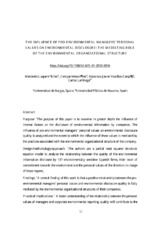Mostrar el registro sencillo del ítem
The influence of pro-environmental managers’ personal values on environmental disclosure: The mediating role of the environmental organizational structure
| dc.contributor.author | Luque Vílchez, Mercedes | |
| dc.contributor.author | Mesa-Pérez, Enrique | |
| dc.contributor.author | Husillos, Javier | |
| dc.contributor.author | Larrinaga, Carlos | |
| dc.date.accessioned | 2024-01-23T19:33:00Z | |
| dc.date.available | 2024-01-23T19:33:00Z | |
| dc.date.issued | 2019 | |
| dc.identifier.issn | 2040-8021 | |
| dc.identifier.uri | http://hdl.handle.net/10396/26695 | |
| dc.description.abstract | Purpose–The purpose of this paper is to examine in greater depth the influence of internal factors onthe disclosure of environmental information by companies. The influence of pro-environmental managers ̈personal values on environmental disclosure quality is analyzed and the extent to which the influence ofthose values is mediated by the practices associated with the environmental organizational structure ofthe company.Design/methodology/approach–The authors use a partial least squares structural equation model toanalyze the relationship between the quality of the environmental information disclosed by 137environmentally sensitive Spanishfirms, their level of commitment towards the environment and thepersonal values of the directors in charge of those reports.Findings–A centralfinding of this work is that a positive relationship between the pro-environmentalmanagers’personal values and environmental disclosure quality is fully mediated by the environmentalorganizational structures of their companies. Practical implications–A better understanding of the relationship between the personal values ofmanagers and corporate environmental reporting quality will contribute to the design of policies that canenhancefirm transparency and accountability, for example, by educating future managers insustainability values.Social implications–Light is cast on the mechanisms that can enhance corporate transparency andaccountability in relation to environmental matters.Originality/value–In this paper, a quantitative study of the internal driving forces of environmentaldisclosure is conducted, an aspect that has often been ignored in the literature on quantitative voluntarysocial reporting. The merit of thisapproach is its contribution to the literature through the analysis ofthe reasons why powerful actors withinfirms could (or could not) develop corporate social reportingpractices. | es_ES |
| dc.format.mimetype | application/pdf | es_ES |
| dc.language.iso | eng | es_ES |
| dc.publisher | Emerald Publishing | es_ES |
| dc.rights | https://creativecommons.org/licenses/by-nc-nd/4.0/ | es_ES |
| dc.source | Luque-Vílchez, M., Mesa-Pérez, E., Husillos, J. and Larrinaga, C. (2019), "The influence of pro-environmental managers’ personal values on environmental disclosure: The mediating role of the environmental organizational structure", Sustainability Accounting, Management and Policy Journal, Vol. 10 No. 1, pp. 41-61. https://doi.org/10.1108/SAMPJ-01-2018-0016 | es_ES |
| dc.subject | Mediation analysis | es_ES |
| dc.subject | Corporate environmental disclosure | es_ES |
| dc.subject | Environmental organizational structure | es_ES |
| dc.subject | Managers’ personal values | es_ES |
| dc.title | The influence of pro-environmental managers’ personal values on environmental disclosure: The mediating role of the environmental organizational structure | es_ES |
| dc.type | info:eu-repo/semantics/article | es_ES |
| dc.relation.publisherversion | http://dx.doi.org/10.1108/SAMPJ-01-2018-0016 | es_ES |
| dc.rights.accessRights | info:eu-repo/semantics/openAccess | es_ES |

